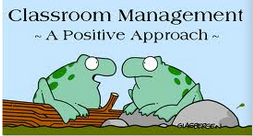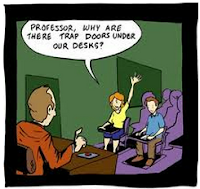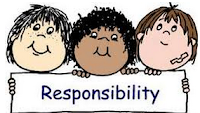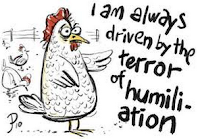Top 16 Classroom Control and Management Tips
21st century education, 21st century teaching skills Med kharbach
One of the daunting challenges that face up newly fledged teachers ( and sometimes experienced ones too) is classroom management issues. Not every teacher is lucky enough to get the wheel turning smoothly right from the start. Disruptive behaviour can pose a real threat to the learning and teaching process and often times it turns a teacher’s life into a living nightmare leading , in most cases, to giving up the job as a whole.
As an experienced teacher who have taught in different countries and as a researcher in the field of pedagogy and methodology ( in connection with technology ) I can comfortably confirm that if classroom management issues are not dealt with seriously they can backfire and destroy what we are trying to build. healthy learning milieu is not feasible without a well managed classroom and this latter requires a set of techniques that every ( new ) teacher should know of.
After digging through the pedagogy books I have assembled and read during my teaching career I came across one that is of paramount importance to new teachers. The book is called ” Psychology for Teachers (Psychology for Professional Groups)” by David Fontana which I highly recommend for you. The book touches upon some key notions including : learning styles, psychology of kids, creativity, motivation………..and classroom management.
I am going to brief you on the most important techniques in classroom management which David recommended for teachers and which I myself have been using for 9 years now.
Classroom Management Techniques :
1- Interest The Class
In general a class that is absorbed in its work does not want to cause problems.The class members will act disapprovingly towards any of their members who try to distract their attention
2- Avoid Personal Mannerisms
Mannerisms of specch, dress, gesture on the part of the teacher can be intensely irritating or comic to children who have to sit and watch them, and may well lead to negative behaviour on the part of the class.
3- Be Fair
Real or imagined injustices can breed resentment and hostility in children. Fairness means ensuring that any loss of priviliges,etc, is appropriate to the original misdeed, it means behaving towards children consistently so that they know what to expect, and it means keeping one’s word. Interestingly, children of all ages rate ” fairness” as one of the most desirable qualities in a teacher.
4- Be Humorous
This does not mean that teachers try to be knock-about comedian, but simply that they are prepared to laugh with the class( though not when the joke is on some unfortunate individual member of it), and to introduce humour into teaching material where suitable.
5- Avoid Unnecessary Threats
When threats are uttered they must be carried out. Constant offers of ‘ one last chance ‘ soon weaken the teacher’s standing in the eyes of the class.
6- Be Punctual
A teacher who arrives late for a class not only sets the children a bad example but also may have to quell a riot before the lesson can begin. Punctuality at the end of the lesson is of equal importance. Children soon resent being constantly late out for break or last in the lunch queue or late for the next lesson
7- Avoid Anger
Teachers who lose their temper may say and do things in the heat of the moment that they come to regret later. Certainly all teachers on accasions will feel the need to speak sharply to children, but this quite different from heated outbursts in the schools or for the state of his or her physical health
8- Avoid Over-familiarity
The line between friendliness and over-familiarity can be a narrow one, but it is better to start off rather formally with a class and become more intimate as one gets to know them better, to behave, indeed, much as one does when making any new friends.
9- Offer Opportunities for responsibility
If all responsibility rests with the teacher, then it is not surprising that children behave irresponsibly when not under difrect supervision. Offering children responsibility not only shows them they have the teacher’s confidence, it also leads them to realize that what happens in the class is their concern just as much as it is the teacher’s.
10-Focus Attention
General appeals for quiet or order in a classroom are of much less value than calling out the name of the child or children most directly involved, and thus focusing the attention of the class.In the silence that follows, the teacher can then issue further instructions.
11- Avoid Humiliating children
Quite apart from the potential psychological damage to the child or children concerned, humiliation attacks a child’s status in the eyes of the rest of the class, and he or she may well use various strategies, all aimed at the teacher’s authority , in order to re-establish it.
12- Be Alert
An important characteristic of teachers with good class control is that they appear to know at all times exactly what is going on in the classroom. They move frequently around the room . and insist children wait in their places when they have difficulties with their work rather than besieging the teacher who became isolated from the main action by a detachment of hand-waving children.
13- Use Positive Language
The emphasis should always be upon what we want children to do rather than upon what they refrain from doing. Thus we say ” come in quietly ” rather than ” don’t make so much noise “, ” look at your books ” rather than ” stop turning around ”
14- Be Confident
Teachers who go into the class with a hesitant, tentative manner suggest to children that they are expecting trouble and are probably accustomed to being disobeyed. Very well, the class think to themselves, the teacher will not be disappointed. If, on the other hand, teachers are able to give the impression they are used to getting on well with children, then once again the children will be included to take this at face value and offer co-operation. So even if the teacher is feeling inexperienced and apprehensive, the moral is not to show it.
15- Be Well-organized
Good classroom organization means :
A– making clear to children exactly what is expected of them in the way of getting out or putting away apparatus and equipment before they start to do it
B– Children know where things are kept and they each have clear duties and responsibilities, both to deal with the normal running of the classroom and with the sudden emergencies when things get split or broken.
C- Planning lessons carefully so that the practical activities are within the scope and the competence of both teacher and class and never threaten to get out of hand.
D– A well-organized lesson with adequate material carefully prepared and with all equipment to hand and in goood working order is way better than one that even the teacher concedes bears a certain resemblance to a shambles.
16- Show that one likes children
Many people , recalling their schooldays, have stories of ogres of whom they were in awe, and of kindly, well-meaning souls whose lives they made a torment, but these stories are only remembered because they are unusual.For the most part, teahers who relate satisfactorily to children have the gift of conveying to them sympathy, understanding, and a personal delight in the job of teaching. They indicate to the class that they want children to succeed not because this demonstrates their own competence but because success is important to children. Once the class is convinced they have the teacher’s support, they will respond, as in any relartionship, with co-operation and esteem.
Source : Psychology for Teachers (Psychology for Professional Groups)















